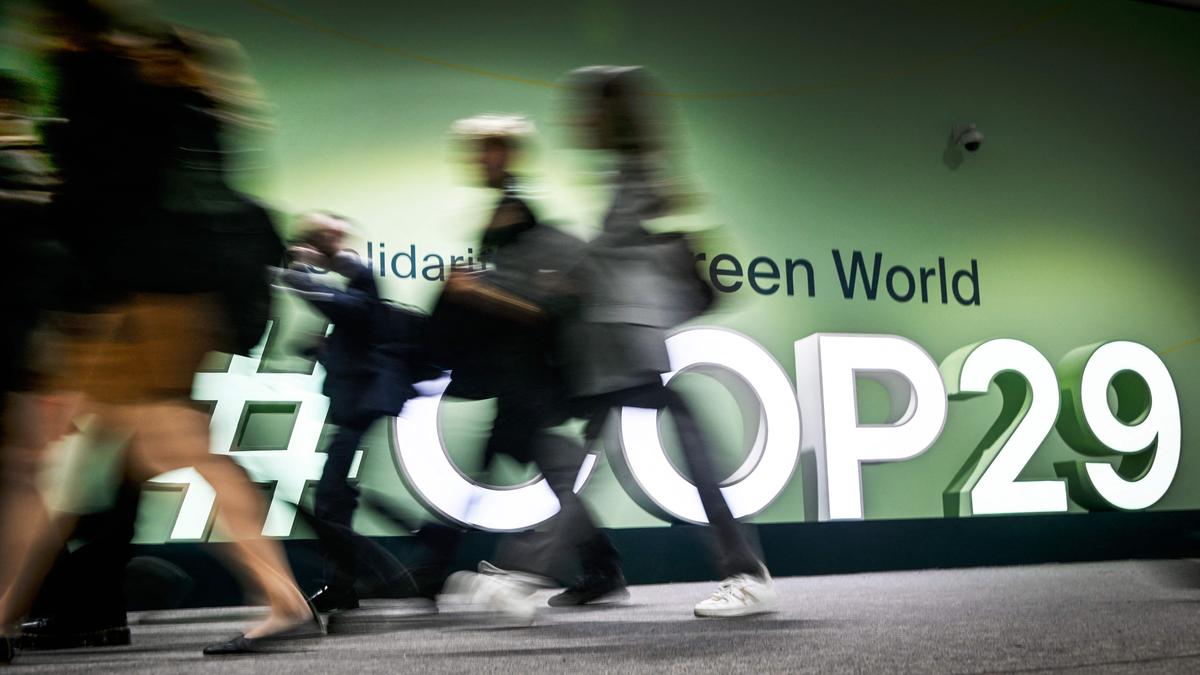 |
|
The 2023 United Nations Climate Change Conference (COP29), held in Baku, Azerbaijan, is nearing its conclusion, with high-stakes negotiations underway to reach a comprehensive agreement on various crucial climate-related issues. The summit, initially scheduled to conclude on November 22nd, has already extended past its projected end date, reflecting the complexity and challenges involved in forging a consensus among participating nations. The primary objective of COP29 centers on establishing a new, ambitious financial target to aid developing countries in their efforts to adapt to the escalating impacts of climate change and transition towards cleaner energy sources. The current goal of $100 billion annually, expiring in 2025, is deemed insufficient by experts, who advocate for a significantly increased target of $1 trillion annually by the end of the decade. This substantial increase highlights the growing recognition of the immense financial resources required to address the global climate crisis effectively.
One of the most significant obstacles encountered during the negotiations involves determining the structure and composition of this new climate finance target. Discussions are heavily focused on defining what constitutes climate finance, including the types of financial instruments (grants, loans, etc.) that will be considered, and which nations should contribute. The inclusion of countries like China among the core donor nations is a hotly debated topic, as it involves considerations of economic capacity and historical responsibility for greenhouse gas emissions. These debates reflect the complex political dynamics that are often at play in international climate negotiations. Agreement on the structure of the new finance target must occur before any meaningful discussion about the financial amount can take place, suggesting a significant challenge remains in reaching consensus on this crucial issue.
The issue of fossil fuel phase-out also presents a major hurdle to reaching a successful COP29 outcome. While a previous agreement reached at COP28 in Dubai acknowledged the necessity of a transition away from fossil fuels, significant disagreement persists about the degree to which this commitment should be explicitly emphasized in the final COP29 agreement. European nations are pushing for strong language reiterating the urgency and importance of this transition, while other groups, including the Arab states, resist inclusion of such language. This divergence of views exemplifies the challenges inherent in balancing economic interests with the urgent need for climate action. The mere presence or absence of phrases related to fossil fuels in the final text will be subject to intense scrutiny by various parties, suggesting that this issue remains a pivotal sticking point during negotiations.
Another area demanding urgent attention is the regulation of carbon markets. While initial progress has been made on establishing quality standards for global carbon credits, numerous issues remain unresolved, notably those pertaining to transparency, trade tracking, and disclosure requirements. The establishment of a robust and effective carbon market is expected to generate significant funding for projects that reduce greenhouse gas emissions, particularly in sectors such as reforestation. However, considerable apprehension exists concerning the potential for loopholes and manipulation in the absence of stringent regulation, leading to a critical need for clear and transparent frameworks that ensure the integrity and effectiveness of such markets. The effective regulation of carbon markets is crucial to generate trust and ensure the success of global climate mitigation efforts.
The final hours of COP29 are likely to witness intense behind-the-scenes negotiations between individual countries and the Azerbaijani presidency, aimed at achieving a consensus-based agreement. Historically, COP summits have frequently extended beyond their scheduled deadlines, with COP28 in Dubai and COP27 in Egypt both experiencing significant overruns. This pattern suggests that a final agreement at COP29 will likely involve extensive compromise and last-minute adjustments. The concluding process of formal approval in the main hall, typically involving several hours of deliberation, further highlights the complexity and difficulty of attaining a final agreement that is satisfactory to all participating nations. The success of COP29 hinges on finding a balance between the urgent need for action and the intricate political and economic realities that shape international climate negotiations.
The outcomes of COP29 will have far-reaching implications for the global community's efforts to address climate change. The ability to finalize a new, ambitious climate finance target will significantly influence developing countries' capacity to adapt to climate impacts and invest in sustainable development. Similarly, reaching a clear and decisive agreement on the transition away from fossil fuels will signal a strong commitment to reducing greenhouse gas emissions. Furthermore, establishing a well-regulated carbon market will provide a critical financial mechanism for supporting climate mitigation and adaptation projects. Therefore, the success of COP29 in resolving these key challenges will play a vital role in shaping the global response to the climate crisis in the coming years. The urgency of the situation necessitates a clear path forward, emphasizing the importance of collaboration and decisive action among nations to avert the most devastating effects of climate change.
Source: COP29: What is needed for a deal by November 22 deadline?
